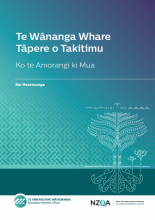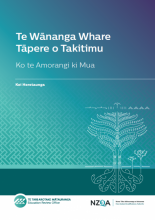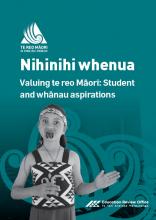- Topics: Employment practices, Learning, Ngā Whanaketanga Rumaki Māori, Playgroups, Special education needs coordinators (SENCO), Te Pou Mataaho | Evaluation and Research Māori
- Published: 25 Aug 2021
Responding to the Covid-19 crisis: Supporting Auckland NCEA students
In 2020, Auckland students were particularly affected by Covid-19 and extra support was provided to them. Following this, ERO undertook an evaluation of three Te Kura programmes aimed at supporting Auckland NCEA students. This report outlines the findings of this evaluation - including the reach and impact of the programmes, and lessons for future responses.
- Published: 25 Aug 2021
Responding to Covid-19: Supporting Auckland NCEA students - Summary
This short summary accompanies the full report Responding to the Covid-19 crisis: Supporting Auckland NCEA students. It outlines the key findings from ERO’s evaluation of three Te Kura programmes aimed at supporting Auckland NCEA students following the lockdowns in 2020. This summary briefly lists who these targeted programmes reached, their impact, and lessons for responding to future lockdowns.
- Published: 19 Jan 2021
Te Kahu Whakahaumaru – Ngā mahi a te rangai mātauranga Māori (English)
Te Pou Mataaho, ERO’s evaluation and research group, and Te Uepū ā Motu, ERO’s national evaluation and review team, pursued this evaluation to provide an evidence base about the initial impacts of Covid-19 on Māori-medium education and how the sector responded.
- Published: 19 Jan 2021
Te Kahu Whakahaumaru – Ngā mahi a te rangai mātauranga Māori (Māori)
I whāia tēnei arotake e Te Pou Mataaho, te rōpū arotake, rangahau hoki a Te Tari Arotake Mātauranga me Te Uepū ā-Motu, te rōpū arotake ā-motu a Te Tari Arotake Mātauranga, ki te whakaputa i tētahi kohinga taunakitanga e kitea ai ngā pānga tōmua o te Mate Korona ki te rāngai mātauranga reo Māori, me ngā rautaki i whāia ai e taua rāngai.
- Published: 10 Dec 2020
Te Kahu Whakahaumaru: Māori continue to show resilience across Māori-medium education
In Aotearoa, Māori-medium education experienced significant disruption when the outbreak of Covid-19 forced kura to close their doors, and whānau and kaiako to adjust to home schooling and distance learning. Among the many challenges were access to technology and resources with Māori communities among the most affected.
- Published: 10 Dec 2020
E whakatinana tonu nei te rāngai mātauranga reo Māori i te manawanui
I Aotearoa nei, i tino raru te rāngai mātauranga reo Māori i te horapatanga o te Mate Korona, i kati ai ngā tatau o ngā kura, i mate ai hoki ngā whānau me ngā kaiako ki te tīni i ā rātou mahi ki te whakaako ki te kāinga me te ako tawhiti.
Ko tētahi raru i roto i te huhua, ko te korenga o ngā taputapu matihiko me ngā rauemi, ka mutu ko ngā hapori Māori ērā i rongo i te korekore rawa atu nei.
- Published: 15 Sep 2020
Nihinihi Whenua – Valuing te reo Māori: Student and whānau aspirations
This report provides a snapshot of student and whānau perspectives on the teaching of te reo Māori. It follows the June publication of Te Tāmata Huaroa, which provides a review of the current status of te reo Māori in English medium school settings.
- Published: 18 Jun 2020
Te Tāmata Huaroa: Te Reo Māori in English-medium Schooling
This report gives a snapshot of the current provision of te reo Māori teaching and learning in a representative sample of English-medium primary and secondary schools. The education sector is seen as an important lever in the Government’s Maihi Karauna strategy for language revitalisation.
- Published: 22 Nov 2019
The Key Competencies: Realising the Potential of the New Zealand Curriculum
This is a companion report to Developing Key Competencies in Students Years 1 to 8. It explores current thinking about the importance of building the capabilities of young people. It outlines what the Key Competencies (KCs) are, why they are important, New Zealand’s journey with thinking about the nature and potential uses of KCs, and where this development fits in the international context.
- Published: 30 May 2018
What drives learning in the senior secondary school?
This evaluation studies effective practice in schools’ senior curriculum. It contributes to the review being undertaken by the Ministry of Education (the Ministry) of the National Certificate of Educational Achievement (NCEA). The Ministry-led review focuses on the implementation of NCEA as the national assessment system for the senior years of secondary schooling.
- Published: 04 Sep 2017
Learning to learn
Clarity of expectations within a supportive environment are key to scaffolding children into the behaviours of effective learners. Those expectations are realised through structures and processes that ensure everyone knows what to do to achieve success.
- Published: 04 Sep 2017
Learning leadership
The team structure in this school supports the professional learning and development of leaders and teachers. Team members discuss their roles, responsibilities and the reciprocal nature of their interactions.
- Published: 05 Mar 2015
Inclusive practices for students with special education needs in schools
This report examines how well students with special education needs are included in New Zealand schools. The report provides an update on progress towards meeting the Government target that, by the end of 2014, 80 percent of New Zealand schools will be doing a good job and none should be doing a poor job of including and supporting students with disabilities.
- Published: 08 May 2014
Improving quality - employment responsibilities in kindergartens and education and care services
This report discusses the effectiveness of employment practices in some kindergartens and education and care services.
- Published: 14 Mar 2014
Your child's education
These booklets have been written for everyone who parents a child - those who have care and responsibility for children attending a school. The booklets include questions you can ask, as well as general information that you may find useful. Click on the booklet to read and download.
Your child's education is an overview of education in New Zealand, from early childhood education through to secondary school. The information and questions are a useful insight into what education looks like in New Zealand and the opportunities available to your child.
- Published: 16 Jun 2013
Stories of Resilience and Innovation in Schools and Early Childhood Services Canterbury Earthquakes 2010-2012
This national report gives an insight into what Canterbury schools and early childhood services experienced during and after the earthquakes. It tells their stories and gives good advice about emergency planning for others in the education sector.
- Published: 09 Sep 2012
Including Students with High Needs: School Questionnaire Responses (2)
All children deserve the right to an education including those with special education needs. Through its Success for All policy, the Government expects all schools to demonstrate inclusive practice for children with special education needs by the end of 2014. This report presents the findings of a questionnaire where schools assess their own provisions for students with special education needs. It follows on from a similar report produced in early 2012.
- Published: 01 Apr 2012
Including Students with Special Needs: School Questionnaire Responses
This report, Including Students with Special Needs: school questionnaire responses presents the findings from a questionnaire completed by schools reviewed in the first two terms of 2011. It is based on schools’ own views of how well they include children with special needs.














